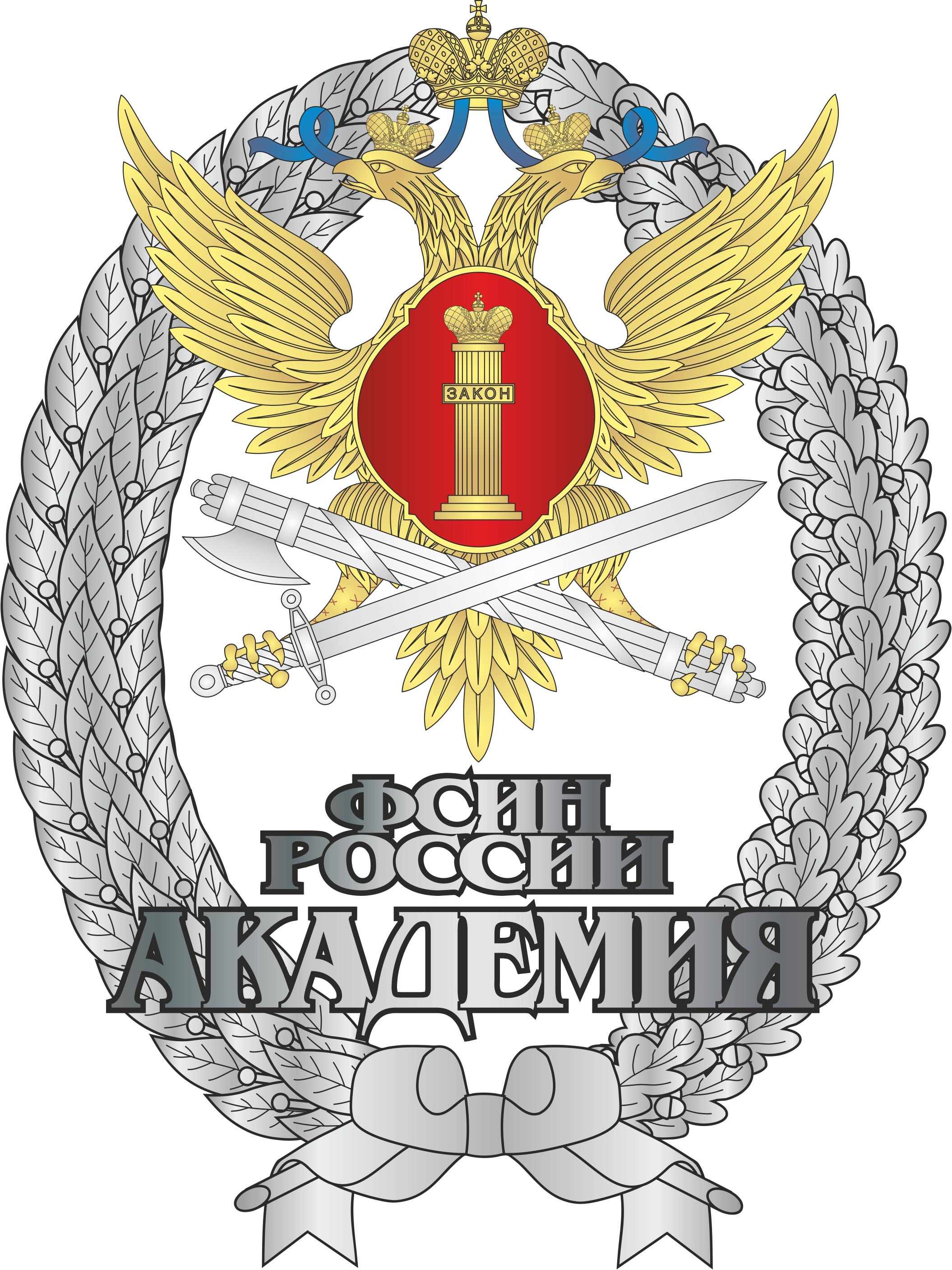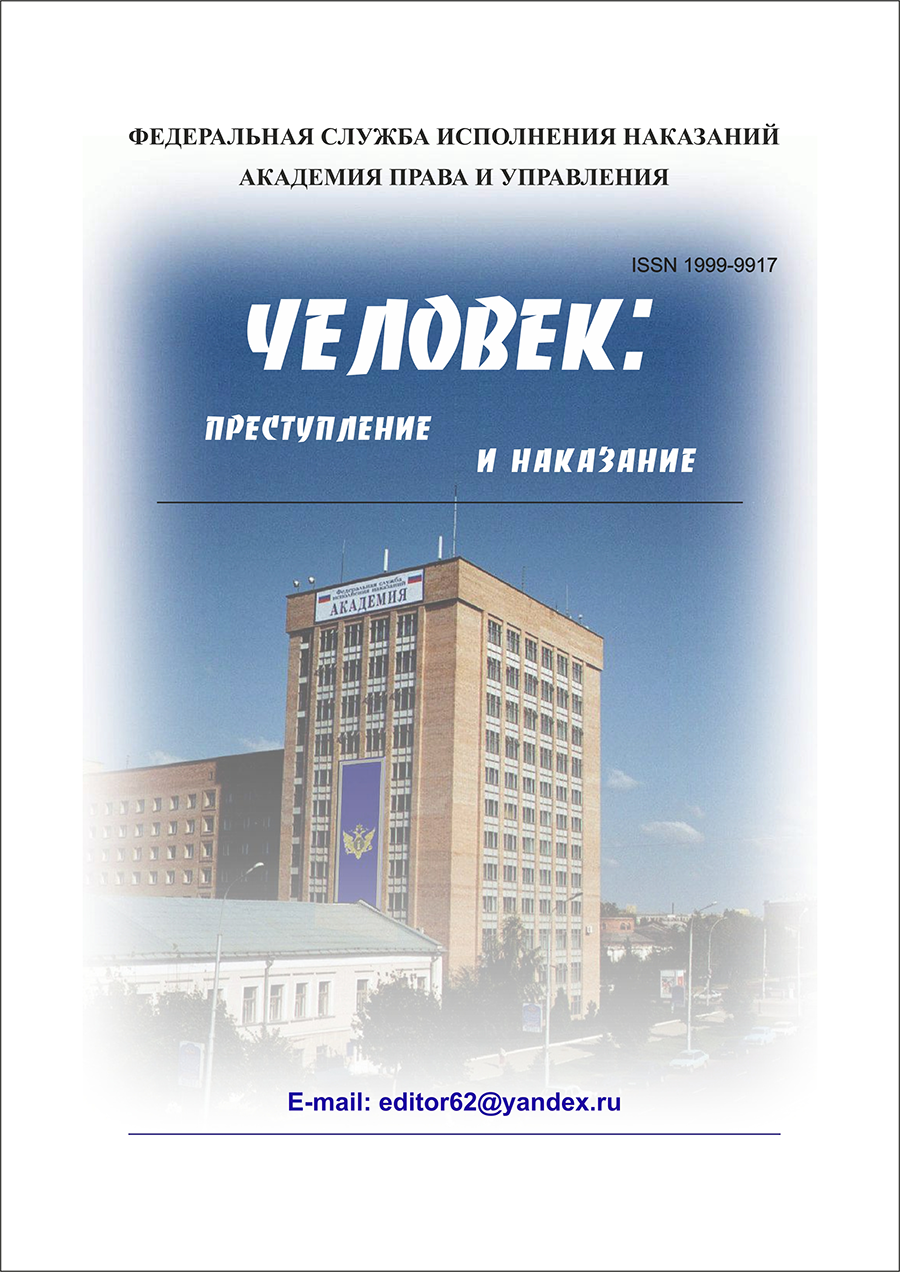UDC 343.8
The article is devoted to the study of the main characteristics of the personality of a penitentiary criminal, obtained as a result of the analysis of empirical materials collected in the period 2010-2022. Official statistics allow us to conclude that over the past ten years the number of crimes committed by convicts while serving their sentences has increased, in contrast to the general state of crime in the country. The author believes that the personality of a penitentiary criminal in recent years has been characterized by a younger age, a higher level of education compared to early studies. The reluctance of convicts to get a job and maintain social ties is noted.
penitentiary crime, correctional institutions, convicts, age, degree of adaptation, education, employment, employees, identity of the criminal
1. Milyukov, S. F. 2000, Russian criminal legislation: the experience of critical analysis: monograph, St. Petersburg.
2. Alekseev, A. I. 1998, Criminology: a course of lectures, Shield-M, Moscow.
3. Antonyan, Yu. M. 1981, ‘The criminal as a subject of criminological study’, in Issues of combating crime, vol. 34, pp. 38-46.
4. Antonyan, Yu. M., Eminov, V. E. & Enikeev, M. I. 2000, Psychology of Crime and Punishment, PENATES-PENATES, Moscow.
5. Belozerova, I. I. 1998, ‘The identity of the criminal and its criminalistic aspect', Investigator, iss. 4, pp. 50-51.
6. Glazer, D. & Rice, K. 1966, ‘Crime, age and employment', in Sociology of Crime, Modern Bourgeois Theories: Collection of Articles, pp. 217-231, Moscow.
7. Dostoevsky, F. M. 1988, Collected Works, in 15 vols, vol. 3, Nauka, St. Petersburg.
8. Ivasenko, Ya. S. 2007, ‘Education as a factor of successful social adaptation of persons released from prison’, in Legislative support of social adaptation of persons released from prison: materials of the round table (Moscow, May 17, 2007), pp. 129-132, Edition of the State Duma, Moscow.
9. Ivasenko, Ya. S. 2014, General and vocational education, vocational training as a means of correcting those sentenced to imprisonment: PhD thesis (Law), Ryazan.
10. Kazak, B. B. & Ushatikov, A. I. 2001, Fundamentals of penitentiary psychology: textbook, Academy of Law and Management of the Ministry of Justice of Russia, Ryazan.
11. Kazberov, P. & Mokretsov, A. 2009, ‘Modern “inhabitants” of correctional institutions', Crime and Punishment, iss. 7.
12. Kondrashkov, N. N. 1971, Quantitative methods in criminology, Legal Literature, Moscow.
13. Kostyuk, M. F. 2000, Criminal law and criminological problems of combating crime in correctional institutions: Sc.D thesis (Law), Moscow.
14. Kuznetsova, N. F. & Luneev, V. V. (eds) 2004, Criminology: Textbook, 2nd edn, Volters Kluver, Moscow.
15. Kuznetsova, N. V. & Eminov, V. E. 1995, Criminology, Moscow.
16. Leikina, N. S. 1968, Criminal identity and criminal responsibility, Leningrad University, Leningrad.
17. Volkov, B. S. (ed.) 1972, Criminal identity, Criminal law and Criminological research, Kazan University, Kazan.
18. Kudryavtsev, V. N., Minkovsky, G. M. & Sakharov, A. B. (eds) 1975, Criminal Identity, Moscow.
19. Melnikova, D. V. & Debolsky, M. G. 2015, ‘Penitentiary stress and features of its manifestation in convicts, suspects, accused’, Psychology and Law, vol. 5, iss. 2, pp. 105-116.
20. Mikhlin, A. S. 1974, The personality of those sentenced to imprisonment and the problems of their correction and re-education: Sc.D thesis (Law), Moscow.
21. Nekrasov, A. P. 2013, ‘Criminological characteristics of the personality of a convicted person who committed a crime in a penitentiary institution’, Bulletin of the Samara Law Institute, iss. 3(11), pp. 43-49.
22. Antonyan, Yu. M., Grishko, A. Ya. & Filchenko, A. P. (eds) 2009, Penitentiary Criminology: textbook, Academy of the Federal Penitentiary Service of Russia, Ryazan.
23. Vocational education of convicts as a factor of their re-socialization: monograph 2010, Academy of the Federal Penitentiary Service of Russia, Ryazan.
24. Gornostaev, S. V., Ushatikov, A. I., Kirillova, T. V. & Lafutkin, A. M. 2017, Psychological problems of professional fitness and service loyalty of employees of the penal enforcement system: monograph, Prospect, Academy of the Federal Penitentiary Service of Russia, Moscow.
25. Saigushev, A. A. 2009, ‘Fundamentals of Christian morality and religious education as a factor in crime prevention of juvenile delinquents and delinquents in the XVIII-XIX centuries’ in The history of the formation and development of the Russian law enforcement system: Collection of materials of the scientific seminar (Pskov, June 5, 2009), pp. 155-160, Pskov Law Institute of the Federal Penitentiary Service of Russia, Pskov.
26. Slonova, M. A. 2011, ‘Ensuring employment as a measure of general social, special criminological, individual prevention of juvenile delinquency’, in Actual problems of combating crime in the Siberian region: collection of materials of the XIV Scientific and Practical Conference (Krasnoyarsk, February 17, 2011), in 2 vols, vol. 1, pp. 150-154, Krasnoyarsk.
27. Starkov, O. V. 2004, Criminopenology: textbook, Exam, Moscow.
28. Utevsky, B. S. 1989, Memoirs of a lawyer, Legal literature, Moscow.
29. Utkin, V. A. 2011, Convicts in colonies-settlements, Based on the materials of a special census of convicts and persons in custody, November 12-18, 2009, V. I. Seliverstov (ed.), Jurisprudence, Moscow.
30. Shesler, A.V. 2000, Group crime (criminological and criminal-legal aspects): Sc.D thesis (Law), Yekaterinburg.
31. Shestakov, D. A. 2015, Theory of crime and fundamentals of branch criminology, Law Center, St. Petersburg.









